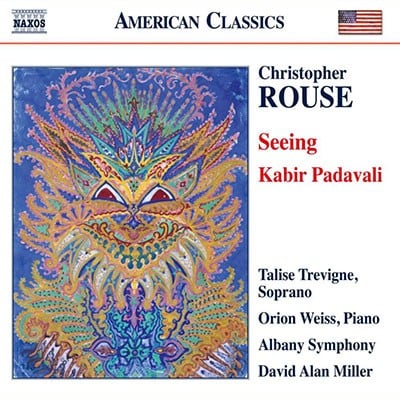Kabir
2(II=picc).2.2.2-4.2.3.1-timp.perc(3):BD/claves/slapstick/glsp/
susp.cym/chinese cym/chinese opera gong/maracas/chimes/tam-t/xyl/
antique cym-harp-cel-accordion-strings
Abbreviations (PDF)
Boosey & Hawkes (Hendon Music)
Commissioned by the Minnesota Orchestra, Kabir Padavali ("Kabir Songbook") was composed for soprano Dawn Upshaw. I completed it on January 12, 1998 at my home in Pittsford, New York.
The great Indian poet Kabir is believed to have lived between 1398 and 1448. I first encountered his poetry in the early 1970s when my study of North Indian classical music yielded numerous songs set to Kabir texts. At that time (1972), I composed a work for soprano and orchestra with the same title as this; however, it was never performed. I resolved then that at some time in the future I would have another "go" at these wonderful poems, and the Minnesota Orchestra commission happily provided me with the opportunity.
I started afresh and—working from English translations by Linda Hess, Robert Bly, and Rabindranath Tagore—selected six poems from scratch. I elected to set them in Hindi, a language that fortunately sounds more often than not reasonably similar to the way it looks, and I owe my deepest thanks to Linda Hess and Douglas Brooks for their help in preparing and providing me with transliterations from Sanskrit. As Kabir neither read nor wrote, his work has depended on centuries of oral tradition for its sustenance; this has naturally led to certain textual problems, and without the help of Ms. Hess and Mr. Brooks, I would have found it impossible to compose this work. Their insights into Kabir's oeuvre and the world in which it was created was also of enormous value.
It was my goal to present a range of Kabir's concerns as a religious poet. Because of its extraordinary beauty, his ecstatic poetry served as the source of the lion's share of my material (songs number 1, 2, 6, and to some extent 5). However, Kabir's humorous side can be discerned in his impish, allegorical text for No. 3, and No. 4 offers one of his sociological rants against the hypocrisy he found all around him. Unlike my 1972 score, this Kabir Padavali does not seek to provide a "musicologically correct" sound world as accompaniment to Kabir's words. There are no specific ragas employed, nor is there an attempt to reproduce Hindu vocal styles in the piece. However, I have attempted—particularly near the beginning and end of this score—to evoke the North Indian sound world in a more general fashion through the use of drones and via several oboe solos, the oboe possessing a sound not dissimilar to that of the Indian shahnai. My use of an accordion also represents an effort to parallel the sound, to some extent, of the Indian harmonium.
The soprano soloist is joined by an orchestra made up of two flutes (2nd doubling piccolo), two oboes, two clarinets (parts in A), two bassoons, four horns (parts in F), two trumpets (parts in C), three trombones, tuba, celesta, accordion, harp, timpani, percussion (3 players), and strings. The percussion section must play bass drum, maracas, claves, slapstick, suspended cymbal, Chinese cymbal, Chinese opera gong, tam-tam, antique cymbals, glockenspiel, chimes, and xylophone. Offstage percussion instruments include another bass drum, another set of chimes, another glockenspiel, plus castanets and ratchet.
Kabir Padavali is dedicated to my son Adrian and lasts approximately twenty-eight minutes.
— Christopher Rouse
Reproduction Rights:
This program note may be reproduced free of charge in concert programs with a credit to the composer.

Talise Trevigne/Albany Symphony/David Alan Miller
Naxos 8.559799
Buy the CD from Amazon

